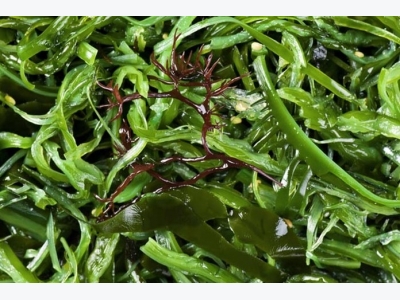Scotland issues first policy guidelines for seaweed farming

The first set of policy guidelines for the commercial cultivation of seaweed in Scotland have been published by the Scottish Government.
Designed to create growth opportunities for Scotland’s seaweed industry by providing greater clarity on where seaweed may be grown and what kinds of developments will be approved, the “Seaweed Cultivation Policy Statement” also sets out the framework for the environmental impacts of seaweed farms. This also includes the following requirements:
- Consider and mitigate adverse environmental impacts
- Ensure that only native species are cultivated
- Be sited away from sources of pollution, where growing for human consumption
- Allow small-medium size farms to be located anywhere in Scotland, subject to agreement and appropriate local conditions
Small-medium is defined in the statement as being up to 50 by 200-meter lines.
At the lower end of this scale, seaweed farms are a similar size to a typical mussel farm with up to 30 by 200-meter lines.
“We are starting to see the growth in seaweed as a commercial product, used in a huge range of items including food, cosmetics and fertilizers,” said Fergus Ewing, Scottish secretary for the Rural Economy.
“We know the west coast of Scotland is the perfect environment for seaweed cultivation and, although the industry is still in its infancy, indications suggest that there may be significant economic opportunities ready to be developed in this area.”
Dr. Michele Stanley, center lead for marine biotechnology at the Scottish Association for Marine Science, said there has been a growing interest in the cultivation of seaweeds in recent years and that the new seaweed statement would start to give this young industry “much needed guidance and clarity” about setting up a seaweed farm.
“It will hopefully help to encourage the expansion of commercial seaweed farming in a sustainable and environmental friendly manner,” said Stanley.
The guidelines do not apply to the wild harvesting of seaweed.
Author:
Jason Holland
- Contributing Editor reporting from London, UK
- jason@jasonhollandcommunications.com
- Twitter at @SeafoodGuruSome
- Instagram (jasonhollandcomms)
Related news
 Seafood exporters slam red tape
Seafood exporters slam red tape The Government will likely ease the requirement for seafood enterprises to submit declarations of conformity with food safety regulations
 Damning water pollution report hurts aquaculture prospects in China
Damning water pollution report hurts aquaculture prospects in China The outlook for low-quality aquaculture in China has dimmed further as a report published
 Offshore aquaculture taking off in Southeast Asia
Offshore aquaculture taking off in Southeast Asia The development of large-scale offshore aquaculture is seen by many as the best method for Southeast Asia to meet growing seafood demand in the region